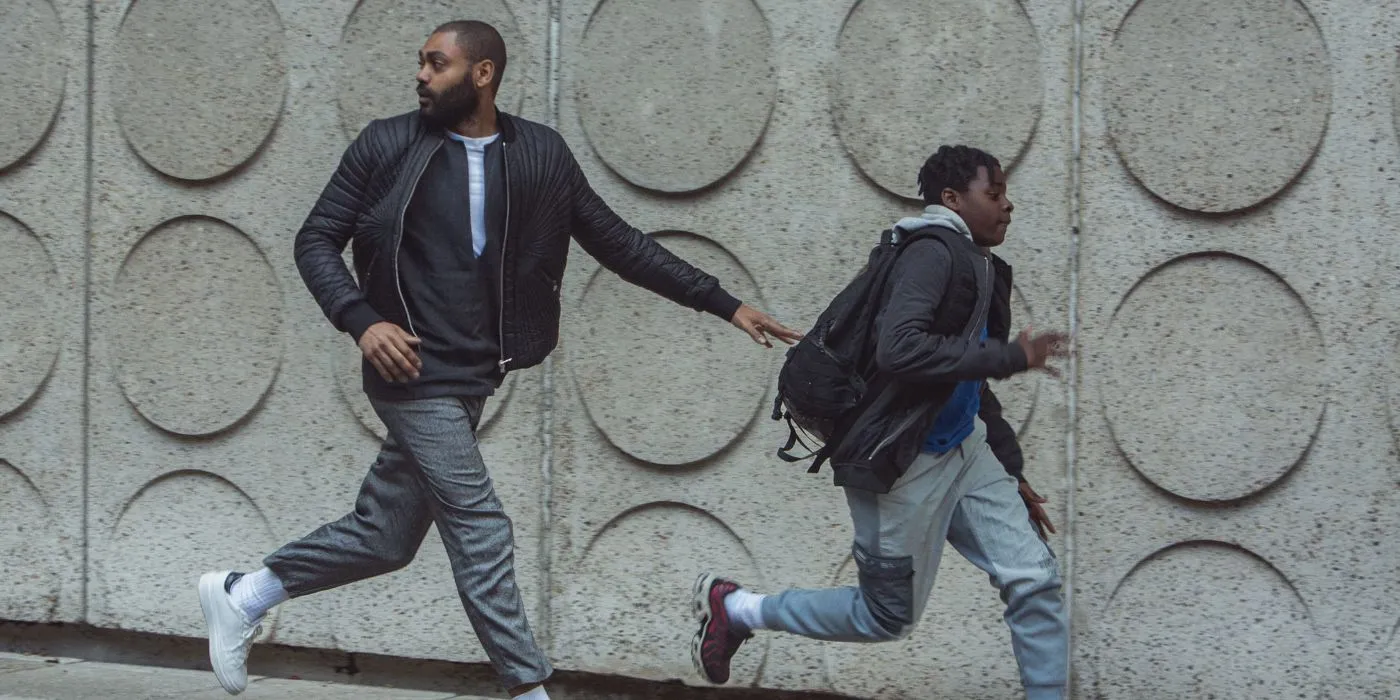Who is at the Door? That is the lingering question on viewers’ minds as the credits roll on The Kitchen, a Netflix film directed by Kibwe Tavares and actor Daniel Kaluuya.
Collaborating with writers Rob Hayes and Joe Murtagh, Kaluuya paints a grim picture of England’s future, where widespread inequality and aggressive privatization have forced many into homelessness.
Though set in a sci-fi environment, The Kitchen does not dwell on the usual elements of the genre. Instead, the story revolves around the strained connection between Izi (Kane Robinson), a solitary figure, and Benji (Jedaiah Bannerman), an orphan boy seeking stability.

However, the final moments take the story in a different direction. The tension reaches its peak in an intense climax, prompting viewers to reflect on the resolution and its connection to the film’s overarching themes.
How Does The Kitchen End?
During the middle of the story, Izi considers giving up the single-person flat he had been waiting for, choosing instead to take one that could accommodate both him and Benji.
However, his selfish instincts prevail, leading him to abandon the boy in the heart of the Kitchen. While he settles into his private space, the police launch an aggressive raid on the neighborhood, forcefully driving out the residents to clear the area for corporate interests.
The following day, a group from the Kitchen gathers to mourn Lord Kitchener (Ian Wright), the community’s DJ and spiritual guide, at Life After Life, the funeral home where Izi works. The mourners’ heartfelt rendition of How Great Thou Art and their warm reception of Izi stir something in him, compelling him to let Benji stay with him.
At the same time, Benji becomes part of a group of displaced Kitchen residents who retaliate by targeting Burlington Arcade, a district catering to the wealthy, whose interests the police have been protecting.
As the mourners grieve and embrace one another, youth leader Staples (Hope Ikpoku Jr.) and his group wreak havoc, smashing shop windows and damaging upscale apartments while Benji watches in terror.
Fearful of what he has witnessed, Benji rushes back home, where Izi is waiting for him. They have an emotional conversation about their relationship, with Izi finally embracing the role of a father figure.
Meanwhile, the police return with even more force, determined to evict Kitchen residents permanently. As Izi and Benji share their final words, the sound of heavy pounding grows louder in the corridor. The last thing viewers hear is the door bursting open as Izi turns to face whoever has arrived.
Who Entered the Room?
The most straightforward explanation is that the police were the ones who broke down the door. Frustrated that their previous raid did not drive the Kitchen residents away, they return with even more aggression, determined to complete the job.
Izi’s relocation to a private flat does not protect him. Despite following all the formal procedures—saving enough money to cover four months’ rent and enduring the rigorous application process—the authorities still see him as just another resident of the Kitchen. To them, he deserves no better treatment than the rest.
If this interpretation is correct, the film ends with Izi and Benji facing arrest, effectively crushing any hope they had of escaping their circumstances. Their dreams of a better life are shattered before they can even begin.
However, a different interpretation suggests that it is the Kitchen residents who have come for Izi, seeing him as a betrayer. The opening scene already hints at his selfish nature when he indulges in a long shower while a crowd waits outside. His acts of kindness toward Benji, though real, may not be enough to erase the perception that he has abandoned his community.
Izi’s actions throughout the film position him as someone willing to turn his back on his people for personal gain. The knocking at the door in the final scene mirrors the knocking at the start—both symbolizing the consequences of his selfishness.
If it is indeed the Kitchen residents at his door, he may be facing their wrath for choosing comfort over solidarity. On the other hand, if it is the police, then he has gained nothing from distancing himself from those he once lived among.
What is the Meaning Behind The Kitchen’s Ending?
Early in the film, Lord Kitchener makes a powerful statement after the first police raid: “They can’t stop we. They can only stop we if we see ‘we’ as ‘I.’” Throughout the story, Izi repeatedly prioritizes himself over the community. In doing so, he weakens those around him while strengthening the forces working against them.
By following the system’s rules, he legitimizes them. At Life After Life, he manipulates grieving people into making expensive purchases, valuing commission over honesty.

Yet, what does he truly gain? Cinematographer Wyatt Garfield captures his so-called “better” home using the same framing as his old space in the Kitchen, making it clear that his new environment is just as empty.
The only difference is that instead of the vibrant presence of Lord Kitchener’s voice, he is surrounded by artificial sounds. The outside world, which once held real life and community, is now replaced by a digital screen attempting—and failing—to mimic nature.
Izi’s choices leave him alienated from those who could have been his allies. He nearly abandons Benji, whether the boy is his biological son or not. In return for distancing himself from his people, he receives a polished yet hollow existence.
When the police launch their final assault, his new address does not offer protection. If it is the Kitchen residents at his door, then he faces the consequences of betraying his own. If it is the police, then his attempt to separate himself from his past proves futile.
The final moments of The Kitchen reinforce the lesson Izi refused to learn: he was never truly alone. There was always a choice—to stand with others or to isolate himself. He made his decision, and now, he must face what comes next.



